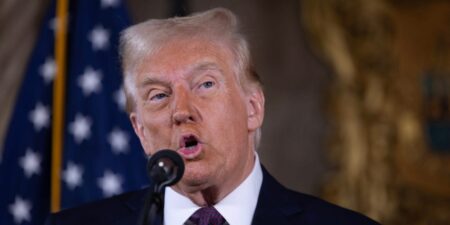Happy almost Friday! Google’s reversal of its promise not to use AI for weapons or surveillance led some employees to run to their meme generators. “Are we the baddies?“
In today’s big story, it’s the last day for federal workers to decide if they want to accept President Donald Trump’s buyout offers.
What’s on deck
Markets: Citi shows no signs of joining Wall Street’s RTO trend.
Tech: Silicon Valley’s new favorite buzzy term is “high agency.”
Business: Some burned-out doctors are ditching the operating room for the board room.
But first, are you in or are you out?
If this was forwarded to you, sign up here.
The big story
Decision day
It’s a critical day for one of the most ambitious and unprecedented ways President Donald Trump is shaking up the federal workforce.
Today marks the deadline for millions of government workers to accept the new administration’s deferred resignation offer.
BI’s Ayelet Sheffey and Juliana Kaplan spoke to some workers mulling their options and grappling with questions about how the buyouts will actually work.
Chief among their concerns are the impact the offer will have on retirement plans, how it will be affected by a potential government shutdown, and why they can’t get more time to decide.
Trump’s buyout offer isn’t completely unheard of. In fact, it looks pretty similar to Elon Musk’s 2022 takeover of X. The key difference is that the public sector is known for its job stability, which may be why the offer is causing so much drama among its workers.
The other elephant in the room is what’ll happen if not enough workers resign. The government is aiming for 5-10% of its more than two million workers to take the deal.
As of Tuesday, more than 20,000 workers had taken buyouts, but the Office of Personnel Management told BI it expected a large spike in the final runup to the deadline.
The Department of Government Efficiency is staying busy in the meantime.
The US Agency for International Development is Trump and Musk’s latest cost-cutting target. The agency’s staff was notified earlier this week that all personnel except for a few essential workers would be placed on administrative leave on Friday.
BI’s Noah Sheidlower has a breakdown on how the foreign aid agency, which distributed nearly $32.5 billion last year, spends its money.
Speaking of money, the group that controls government payments — the Treasury Department — is also in Musk’s crosshairs. President Trump gave Musk’s DOGE access to the government’s payment system, which caused quite the stir.
The White House has maintained DOGE is limited to “read-only access” and its work on the Treasury plays into DOGE’s overall mission of reducing government waste. But that hasn’t eased concerns over the potential impact on a system that manages trillions in payments, including Social Security and tax refunds.
It’s the latest example of the incredible power the world’s richest man appears to hold within the US government. House Speaker Mike Johnson isn’t worried, though. He defended DOGE’s role and said there is a “gross overreaction in the media” over how Musk is trying to cut spending.
News brief
Top headlines
1. Palantir stock is on a hot streak, but Wall Street’s not biting. Palantir stock surged 28% after it reported a strong Q4 earnings beat, putting it up almost 35% this year. Even so, few analysts are bullish on it. They’re concerned about Palantir’s high valuation and skeptical it can grow enough to maintain its current stock price.
2. Working for Citi doesn’t mean having to go into the city. Wall Street titans are leading the charge with RTO mandates — except Citigroup. On a quarterly call with executives last month, CEO Jane Fraser emphasized hybrid work and mentioned it could give the bank a competitive edge when it comes to recruitment. Regardless, the company is still shelling out $1.2 billion for its new London office.
3. The advisor behind BlackRock’s alternative assets expansion. Bob Steel, vice chair of boutique investment bank Perella Weinberg, has a laundry list of career achievements: two-time bank CEO, Goldman partner, and US Treasury undersecretary. More recently, Steel gave longtime friend Larry Fink some advice on BlackRock breaking into alternative investments. In a chat with BI, Steel explained his process with Fink and shared some wisdom for up-and-coming bankers.
3 things in tech
1. Broke: “disruptor.” Woke: “high agency.” Silicon Valley has a new buzzword to describe the successful, smart, and self-motivated. It’s called “high agency,” and it’s everyone’s favorite new label.
2. It’s not “RIP Temu and Shein” anymore. The two retailers disrupted the e-commerce industry by avoiding paying duty on shipments through a provision of customs law called Section 321, also known as de minimis. Many thought Trump’s recent executive order closing that loophole would be a death knell for the companies. Temu and Shein will suffer a blow — but it might not be as bad as many initially thought. And if you recently placed an order, it should be fine.
3. DeepSeek’s low-cost AI revolution isn’t here … yet. When it burst onto the scene with its cheaper-to-build and cheaper-to-run models, DeepSeek was expected by some to revolutionize the entire AI startup system. That hasn’t happened yet. Cloud providers are having trouble offering customers access to DeepSeek at fast and reliable speeds, slowing down the big switch to low-cost AI that startups had hoped for.
3 things in business
1. Doctors facing burnout may ditch the stethoscope. Tech companies are looking to bolster their credibility, especially with health innovation, and doctors are pitching in. Chief medical officers make $275,000 a year on average in the US — and don’t have the crazy hours doctors normally deal with. Some say these corporate roles let them have a bigger impact on an otherwise “broken” health system, even amid a looming physician shortage.
2. Disney’s game plan, in Iger’s words. The company’s sports streaming moves have been a roller coaster ride full of similar-sounding names — Venu and Fubo and Hulu, oh my! The abundance of options makes it difficult for consumers to understand Disney’s sports strategy, a point an analyst raised on the company’s earnings call. CEO Bob Iger clarified the goal is to make ESPN “as accessible as possible” and gave a little more insight in response.
3. “Moneyball” author Michael Lewis thinks the sports betting boom could become a mess. In 2018, gambling and media companies approached sports betting with caution. Today, gambling apps are met with little resistance, and college-aged men are getting in on the action. BI’s Peter Kafka spoke with Lewis about how sports betting went mainstream — and what the fallout could be.
In other news
What’s happening today
The Insider Today team: Dan DeFrancesco, deputy editor and anchor, in New York. Grace Lett, editor, in Chicago. Ella Hopkins, associate editor, in London. Hallam Bullock, senior editor, in London. Amanda Yen, associate editor, in New York. Elizabeth Casolo, fellow, in Chicago.
Read the full article here
















